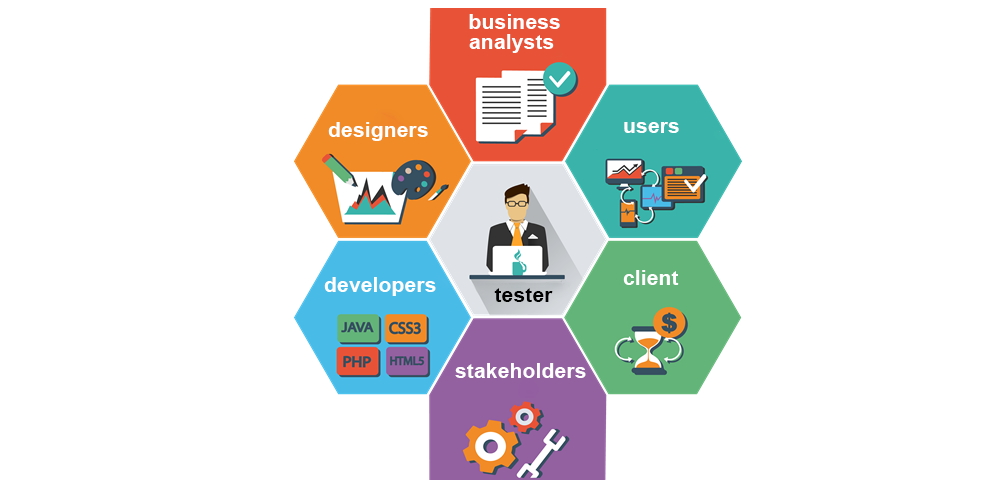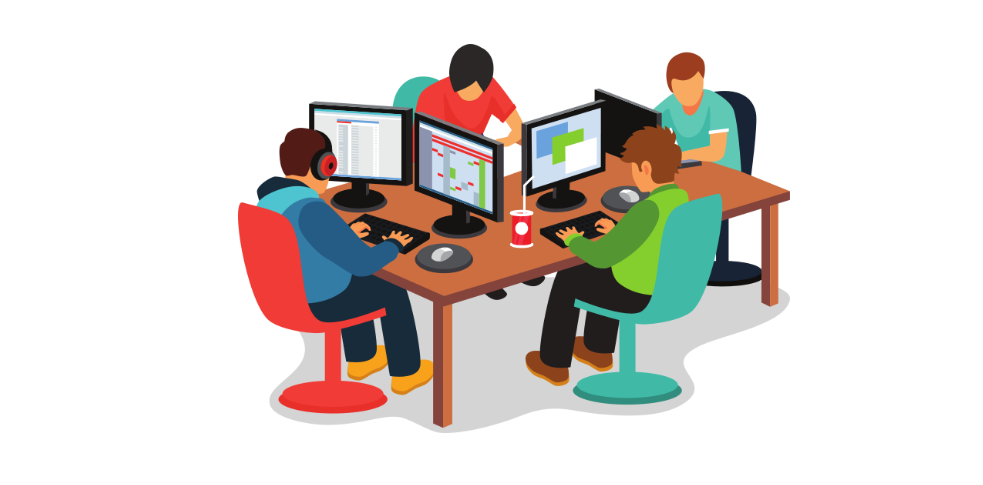All types of communication play a crucial role in a tester’s life.
Every QA engineer will sooner or later face the situation when he/she will need to be online the whole day.
He/she will need to call the managers to define all details of the product in development, take part in the meeting to discuss a new project, and so on.
Having such a schedule will make a person think in the evening that he/she has just wasted his/her time, in some way.
This happens because this doesn’t cancel his/her direct responsibilities that are connected with the process of technical testing of software.
The job of a QA engineer is the role that entails communication with numerous people (developers, clients, managers, analysts, designers, and sometimes – potential users of a product) on all possible topics while performing software testing.
Their cycle of professional communication is quite big and he/she needs to build respective and clear communication with each of them.
Let’s analyze each type of communication more thoroughly.

Tester’s Communication with Other Workers
Communication with designers
This category is creative people whose primary task is to design the future software. A tester may ask them questions that are tightly connected with the product’s mockups during his/her work.
It’s very pleasant to talk to designers. For example, when you express your dissatisfaction with the way a certain element is displayed, you receive 2-3 new variants at once and this differs from the communication with developers who will never do such a thing.
Designers are creative and easy-going people and you may rarely face any issues with them.
Communication with the development department
A tester and a developer are people who are always located close to each other and can’t do without each other.
We may initiate a long-lasting discussion on this topic but it’s meaningless.
If there are no good relations between them, a project will be never successful!Factors that don’t let a QA engineer and a developer collaborate efficiently
Indifference
Everyone may have difficulties that may be not connected with work.
Yes, you should leave all your home business at home but sometimes a person takes this to his/her office.
Therefore, the overall performance of a worker decreases, a person stops to show his/her initiative, he/she can’t meet the deadline and can’t finish his/her task.
In such cases, it’s better to support your colleague, even if you don’t really understand the nature of his/her main problems.He/she can’t accept constructive criticism
Every day, such a problem becomes more and more popular in every team.
After finding an error in software, a tester sometimes simply forgets that everything has been created by another person who has spent his/her time and strengths and so you should kindly inform him/her on this, not hurting him/her with your critical comments.
You should deliver any critical comments in such a way that it completely saves good relations between people.For example, a tester has found a defect and needs to tell this a developer. You can express this in two different forms and the sense of your words will have not simply different tone but a type of its expressing, too.
Complicated person
These are people that are very hard to interact with. They don’t react to your comments, ignore the calls. It’s very bad if such people are on the client’s side since this will obviously turn into conflicts and will cause disputes at meetings.
You simply need to be persistent and also be careful in a corporate sense. Very strong pressure may have very negative consequences for you.
First and foremost, you should never believe in such a popular thought that it’s impossible to work with any person. You just need to know how to pull strings and try to get to know the person better.

Work of a Tester
Some tips how a tester and a developer can live happily and amicably
Never be strict at judging for errors
If you have found a very critical bug, you shouldn’t laugh and make fun of a developer. You should always remember: a tester works with limited time and resources but the same thing may be applied to a software developer.
It’s impossible to create bug-free software, that’s why the testing field still exists.Share the ideas
Constant communication between a tester and a developer helps to properly generate ideas from both sides (sufficiently).
A developer can give working advice on the way to properly check a new module and a tester, meanwhile, can show the method of fixing the defect that has been previously found.
Priorities at any situation
The project’s group should be always more important than the found defect or the point of view of a separate member of the developer team.
If a developer constantly tells a manager that some defects that a tester is telling about are trivial or are found to make him/her mad, it seems that these are the problems of his personal ego.
Try not to lose your temper in every situation, especially at work since, in such a way, we deprive ourselves of the possibility to work and others – to grow in a professional way.And to properly set the priorities, you should follow the next rules and recommendations:
- The motivation for every day. A tightly-knitted group always makes a person search for new initiatives, grow professionally, make him/her desire to develop his/her professional skills, self-develop;
- Perfect mood. When there is a good atmosphere inside a team, a person will happily go to the office and is ready to do his/her best;
- Personal development. When there is a good rivalry, everyone develops. Constant exchange of efficient ideas and accepting the offers from another person, give us the possibility to develop in a professional way.
Communication with business analysts
Not all projects imply the work of the department of business analysts. Sometimes other members of the software development lifecycle play this role.
But if such a department is present in a company, the rest members of the team may definitely think that it’s very good. This has the following advantages:
- Perfect requirements. All user stories are aimed at business, to some extent, the development side doesn’t really matter, there a strict task that must be executed. And a proper way to do this is the main task of a developer and a manager;
- There is a person who is responsible for everything. If a client doesn’t like something in the developed functionality, you may always mention that some part of the functionality is created not according to the establishes requirements and so a business analyst should explain where he/she found these requirements;
- Good understanding. You can always tell about some moments of the development process, find all advantages and disadvantages, make a necessary decision at the primary stage of software development.
Every business analyst plays the role of an interpreter in some way who should analyze the user needs and their needs to the project group in the clearest way.
Properly built relations between a tester and a business analyst help the first one to greatly simplify his/her professional work since he/she always has access a person who can tell a client all thoughts on the functionality and also, receive clear and qualitative feedback with the newest requirements.
Communication with a client
The main things that a tester should develop may be structured in a certain group.
Stress resistance. Clients may have a different character: aggressive or business-like. We may continue such a list of new examples for a long time but the main thing is that you should resist this and try to sustain the business manner of communication.
Fairness. If a new function can’t be delivered in time because you improperly estimated the time needed for the development, you should say this honestly and don’t lie. Yes, it’s your fault, but people who can confess that they are guilty can be trusted and appreciated.
Initiative. You should always show sober and clever initiative but there shouldn’t be too much of it. If you are very intrusive, you may lose your job.
It’s very important to prove why the things you mentioned must be implemented, especially from the client’s side since his/her wishes are the main factor in making the decisions at any project.
General informativeness. A client should always see that the work is being done, so you need to visualize the process of implementing the paid functionality completely.
Constant listening to client’s needs. You should always listen, not simply talk about something. Even if you discuss the weather outside the window, you should express your interest in a client, not vice versa.
If you follow all above-mentioned rules, the project will have many benefits such as:
- Trust and general respect from the client’s side;
- Growth in salary;
- Sense of personal independence and responsibility.
Conclusion
Today’s informational world created one of the most important rules: if you want to be a successful specialist, it’s not enough to have skills and experience, you need to have something else, that you may gain exclusively in practice.
Such soft skills allow not only to adapt to the modern realities of software tester’s job but also, to develop certain leading skills that allow them to climb the career ladder, value the work time, and self-develop.










Leave A Comment